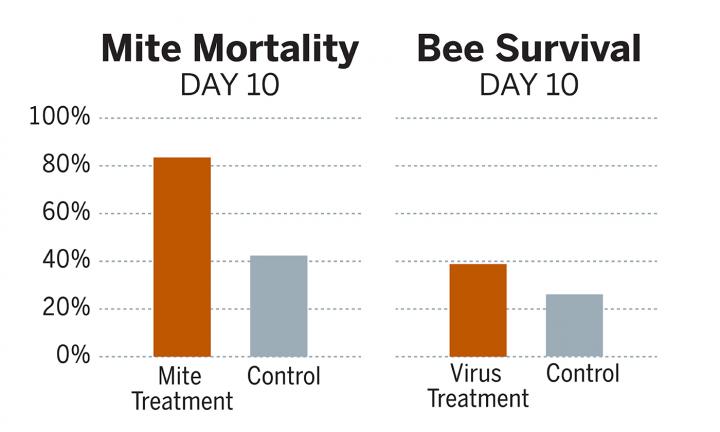Though blaming science failed to catch on, science may provide a solution to the real cause of colony collapse disorder, Varroa mites and deformed wing virus. That solution is genetically engineered bacteria. A new study shows the engineered bacteria are easy to grow and they live in the guts of honey bees and act as biological factories, pumping out medicines protecting the bees against varroa and deformed wing virus.
In 2006, after environmental groups created a media frenzy by repeating claims that colony collapse disorder was a new phenomenon brought on by chemists, a group began to survey larger beekeepers about their losses during the year, and in that survey there was a larger die-off over winter for the first time.(1)
During the short term the beekeeper survey has been used, winter losses are routinely under 30 percent so 40 percent is the kind of blip that happens and one that science is finally tackling.(2) That is the perfect time to talk about a biological alternative to the only thing that works right now - pesticides.(3)
Varroa mites and deformed wing virus often go hand-in-hand; as mites feed on bees, they can spread the virus, while also weakening the bees and making them more vulnerable to pathogens. To address each problem, a team lead by University of Texas at Austin Professor Nancy Moran engineered one strain of bacteria to target the virus and another for the mites. Compared with control bees, the bees treated with the strain of bacteria targeting the virus were 36.5 percent more likely to survive to day 10. Meanwhile, Varroa mites feeding on another set of bees treated with the mite-targeting strain of bacteria were about 70 percent more likely to die by day 10 than mites feeding on control bees.

Rather than Mutagenesis, GMO, or CRISPR, the genetic engineering used for bees leverages an antiviral defense mechanism called RNA interference (RNAi) that helps fight off RNA viruses. When an RNA virus is introduced, it produces molecules called double-stranded RNAs that a healthy cell detects, triggering an RNAi immune response.
To promote a helpful RNAi response to viruses in bees -- and trigger a lethal RNAi response in the mites -- the team introduced modified bacteria to hundreds of bees in a laboratory setting. Sprayed with a sugar water solution containing the bacteria, the bees groomed one another and ingested the solution. The team found inoculating young worker bees with the engineered bacteria led the bees' immune systems to be primed to protect them against deformed wing virus, which is an RNA virus, and caused the mites' own immune systems to fight against and ultimately kill them.
People who don't understand biology are concerned about genetic engineering but the type of bacteria used are highly specialized to live in the bee gut, can't survive for long outside of it, and are protective for a virus that strikes only bees. That will be shown in detail before this gets regulatory approval.
NOTES:
(1) Beekeeping hit a 20-year high in 2014 but activists opposed to pesticides claim that is off from the 5.5 million in the early 1950s - but bees were part of the World War II effort to fight fascism in Europe and Asia so hive numbers plummeted after that.

(2) Recorded in the years 950, 992, 1443, 1853, 1868, 1891, 1896, 1903, 1905, 1918, 1919, in the 1920s, the 1930s, the 1960s, 1975 and 1995, but likely happening far more often and not documented.
(3) It's why there is very little "organic" honey. The National Organic Standards Board has yet to exempt a synthetic pesticide that works to kill varroa mites, the way they exempt 80 synthetic products to help their farmers stay afloat while pretending they have no synthetic ingredients in them. Beekeepers who try to raise bees are a ticking time bomb for mass deaths due to nature.





Comments